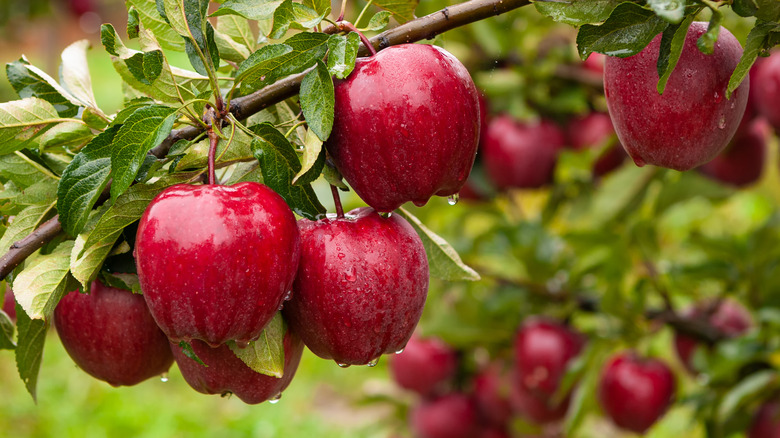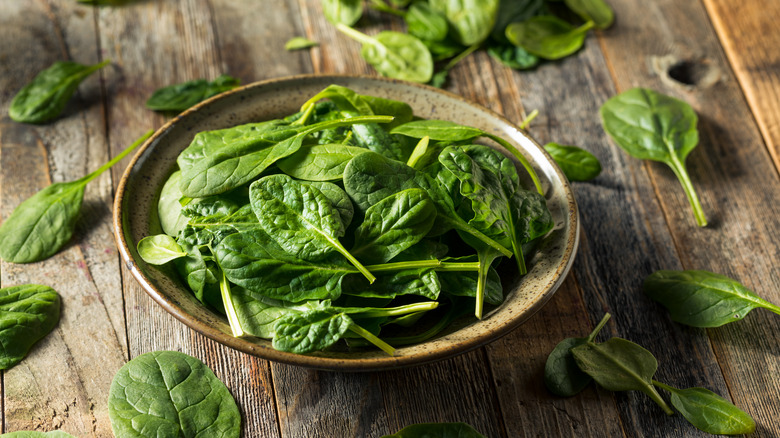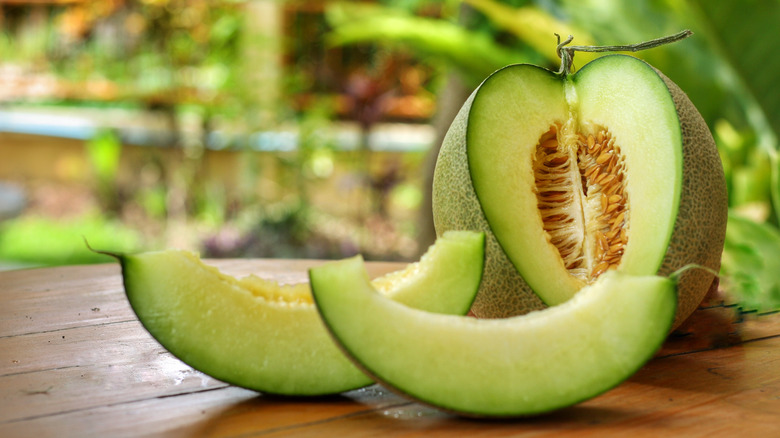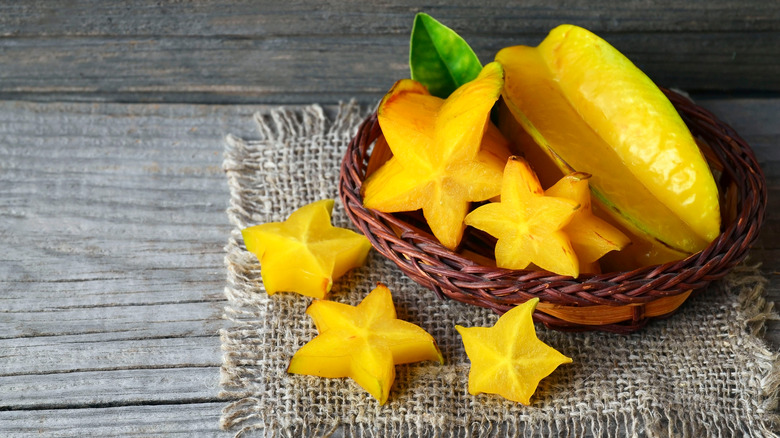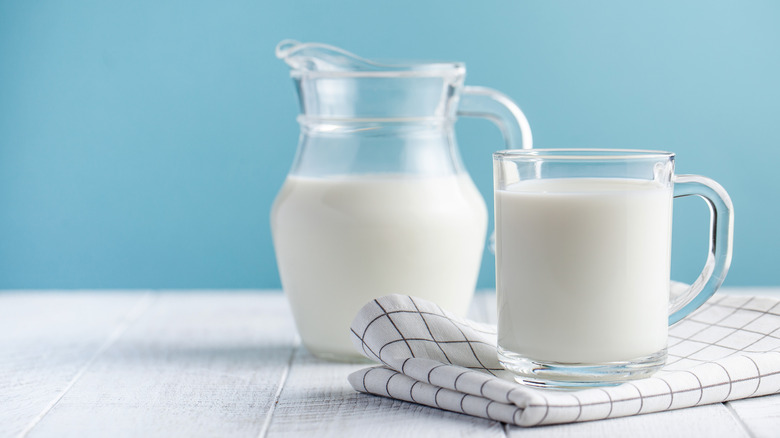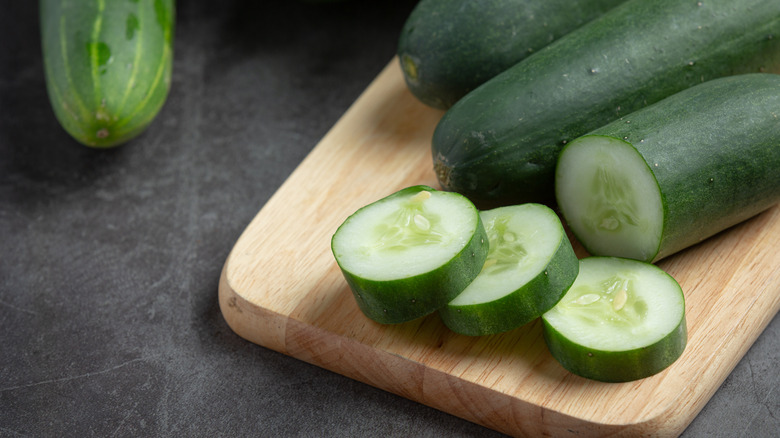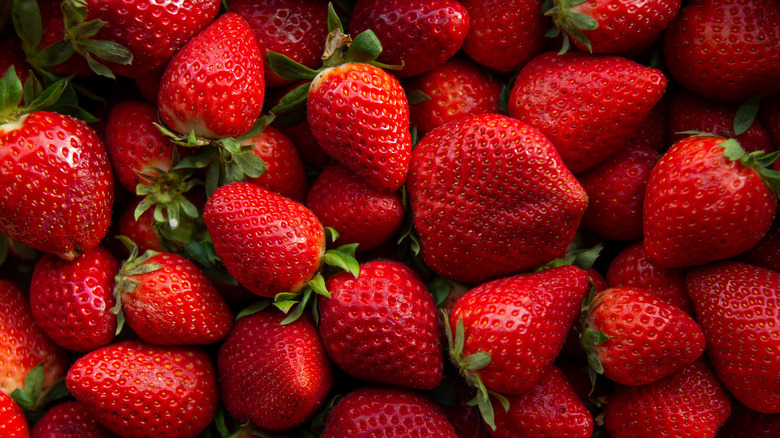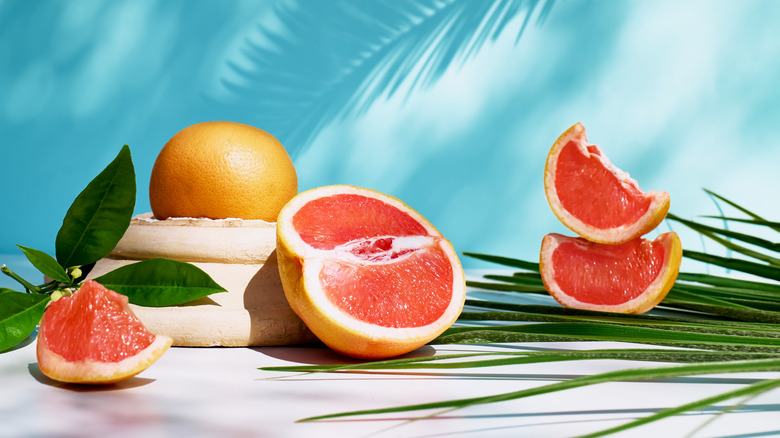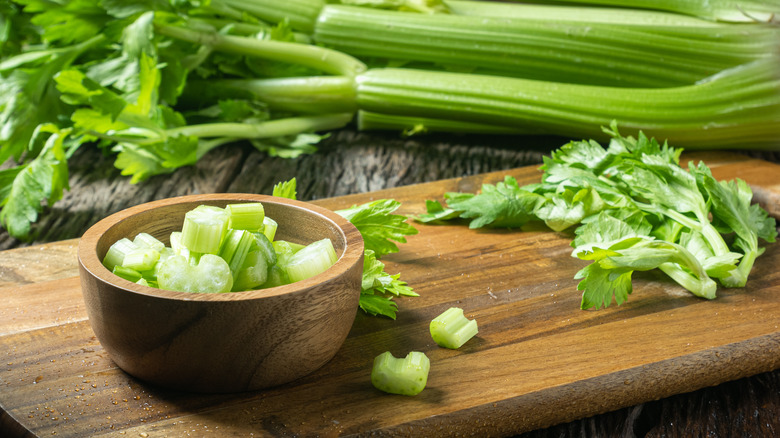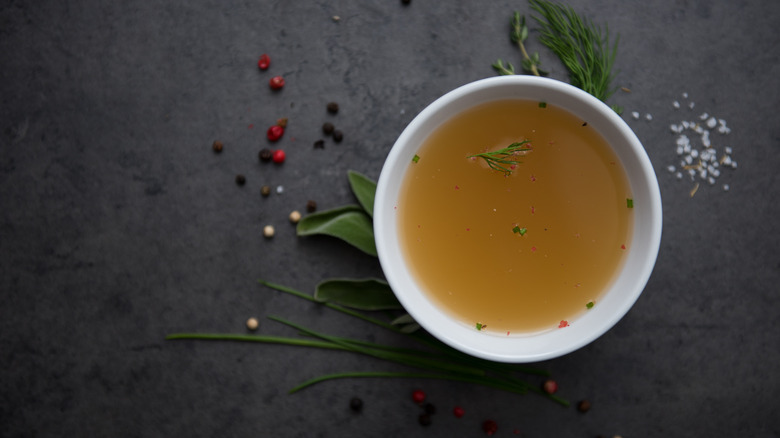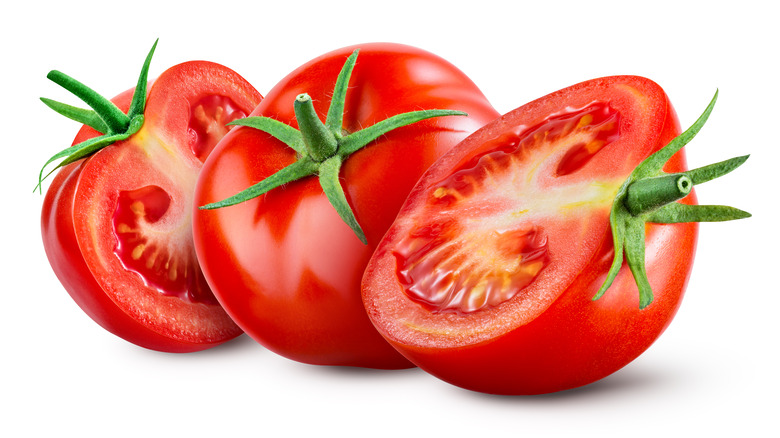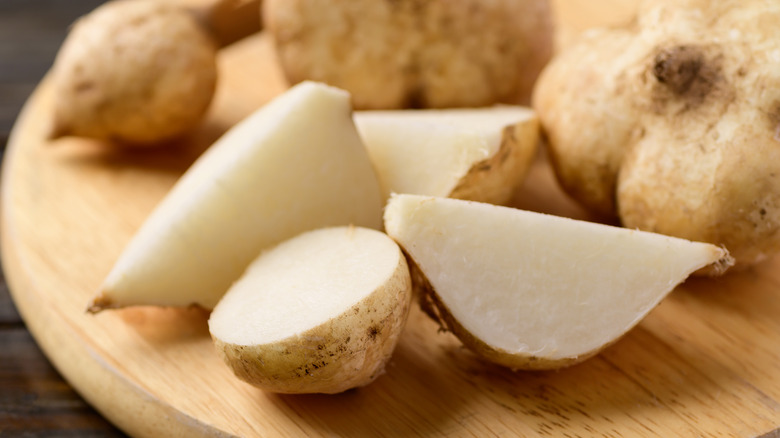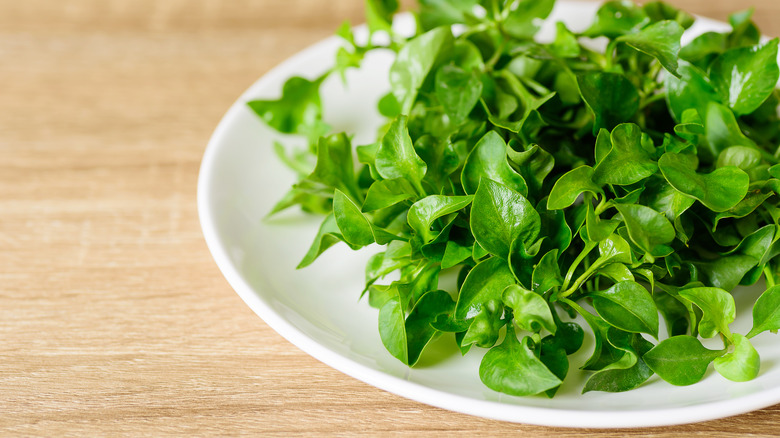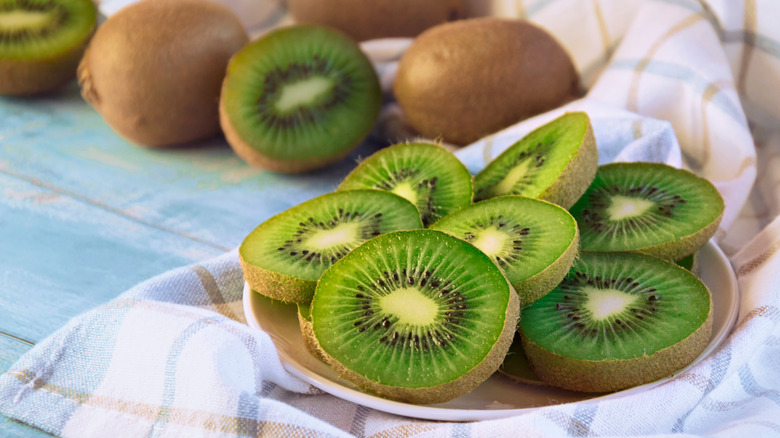Foods That Help You Stay Hydrated
We've all heard the 8x8 rule when it comes to water. To stay properly hydrated, we're supposed to drink eight 8-ounce glasses of water per day. The more active you are, the more likely you'll need to consume even more water since sweating depletes your body's fluids. And, yes, on paper, this all makes sense. But, let's be honest, drinking that much water everyday does not sound appealing. After all, water is refreshing but plain.
Sports drinks, on the other hand, come in many different flavors and are loaded with electrolytes, which help you stay hydrated, according to Reader's Digest. It definitely sounds like a win-win, and it can be, but not all sports drinks are the same. Some have added sugar. Others are loaded with chemicals. And, overdoing it when it comes to these thirst-quenching beverages can raise your salt levels (remember, you still need to observe portion size, so check your food labels).
So, what is the solution? Well, as with many aspects of nutrition, variety can be the secret to crafting the perfect meal plan for your needs. Fortunately, when it comes to hydration, there's a wide variety of foods that can help your body stay healthy. So, does this mean you'll never have to drink water again? No, but it might mean you won't need to drink as much water to meet your hydration needs.
Apples
If any food is a symbol of good health, it's the apple. After all, the old saying is "an apple a day keeps the doctor away," so this little fruit must be doing something right. And while the apple has a host of health benefits, it's actually better for hydration than water, reported the Hydration Foundation.
Yes, you read that right. According to the Hydration Foundation, the sweet, crunchy apple beats out water because it's an excellent source of fiber. Why should that make a difference? Well, think of your stomach like a funnel. Water would run out of it very quickly but, a mashed-up apple, which is 85.56% water, would exit the funnel more slowly (via Medical News Today). And, the slower water exits your body, the longer you stay hydrated. In fact, Shape magazine recommends applesauce as a great food option for staying hydrated. However, one word of caution: some brands of applesauce add sugar and other ingredients (both artificial and natural) that may not be great for hydration or your overall health. So, if you're going to buy applesauce, read your food labels and choose one that is unsweetened.
Besides their natural fiber, the juice in apples is also instrumental to staying hydrated since it's packed with electrolytes, the Hydration Foundation also noted. Yes, the same nutrients and minerals found in many sports drinks are also available in apples. This is crucial to avoiding dehydration, since electrolytes help your body's cells absorb water.
Spinach
The iconic American comic strip character, Popeye, has been adopted into cartoons, comic books, and a movie, starring Robin Williams. And, while there might be some slight tweaks to his character with each new incarnation, one thing remains the same: Popeye gets his incredible strength from eating spinach. Of course, for the rest of us, spinach isn't going to instantly give us Superman-level muscles, but that doesn't mean this vegetable isn't power-packed with nutrients and water.
According to the Cleveland Clinic, spinach is 91% water. Impressive? Yes, but in all fairness, other green vegetables do beat out Popeye's favorite food when it comes to hydration. Iceberg lettuce, for example, is 95% water, and romain lettuce is 93.47% water (via the Cleveland Clinic and Medical News Today). But, like Popeye, don't count spinach out just yet. Besides being an excellent source of hydration, spinach is packed with antioxidants, which may reduce your risk of developing Parkinson's disease, diabetes, and cancer (via WebMD). Plus, it's been shown to support good eye, heart, and bone health, as well as boost your immunity and help you recover faster from wounds.
In addition, eating spinach is a great way to avoid developing anemia since it's rich in iron (via WebMD). And, if you're expecting, this vegetable can help your baby grow and develop. However, everyone's health history and needs are different, so you need to speak with your health care professional about adding spinach to your diet, especially if you're pregnant.
Melons
It's no shock that melons are ideal for staying hydrated. Overflowing with juice, these members of the fruit family are especially refreshing when the weather's hot. And, like so many healthy food choices, melons bring more to the table than just their water content.
As Healthline explains, watermelons are 92% water but are also a good source of fiber. What is fiber? It's the indigestible parts of fruits and vegetables that slows down the digestive process, which helps you retain hydration. But, that's not all. Watermelons are low in calories, which makes them great for weight management. And, they're packed with antioxidants that help reduce your chances of developing health issues with your heart, and nutrients like magnesium, vitamin C, and vitamin A.
While watermelons are very popular, don't overlook another exceptionally sweet member of the melon family: the honeydew. Popular as a standalone dessert, honeydews are made up of 90% water (via Healthline). But, more importantly, just like its fruit cousin, the apple, honeydew melons have a similar effect on your body as the mineral-infused sports drinks that athletes prefer over water. How? Because they have sodium, magnesium, calcium, and potassium. And, as if that wasn't enough, honeydews have other possible health benefits like supporting your immune system, keeping your blood glucose levels steady, and managing your blood pressure. They are also good for your eyes, your skin, and your bones, as well as your digestive system.
Star Fruit
Cutting fruits into fun shapes can add to their presentation. After all, it's practically the cornerstone of every Edible Arrangements bouquet. But, a certain member of the tropical fruits family doesn't need any fancy shaping to be festive or keep you hydrated.
Although it's called the carambola, this juicy food, made up of 91.4% water, is better known as star fruit, according to Health. And, it's not hard to see why. Cutting it into pieces like a cucumber results in perfectly star-shaped slices. Eating star fruit is not only a fun way to avoid dehydration, but these little treats are also packed with epicatechin, an antioxidant that's good for your heart. In addition, research is exploring other possible health benefits of star fruits, like if consuming them lowers inflammation, cholesterol, and the risk of developing liver cancer (via Healthline).
While carambola can be great for dehydration, it does contain large quantities of oxalic acid (via Health). Keep in mind that oxalic acid is used in some cleaning and bleaching products, making it a very strong, and even toxic, acid. So, if you are taking prescription medication or have any health issues with your kidneys, randomly adding more star fruit to your diet may be detrimental to your health (via Healthline). Instead, talk with your health care professional about if carambola is alright for you to eat and how much you can safely consume in a day.
Milk
If you've ever watched the YouTube-turned-TV-gameshow sensation "Hot Ones," you've probably noticed that, when someone eats something spicy, they have the option of drinking cold milk. Why? Because it's milk, not water, that is going to relieve the burning sensation from those painfully-hot sauce concoctions. And, now, according to CNN, milk is beating out water in a whole new category: hydration.
Yes, research done by St. Andrews University in Scotland has found that classic cow's milk contains natural electrolytes like sodium. Why does this help with hydration? Well, you've heard of someone retaining water because they eat salt. In fact, this property of sodium is usually seen as something negative since it can lead to "water weight." But, in proper portions, a little salt can go a long way when it comes to maintaining proper hydration. In addition, the study found that the proteins, fats, and sugars in milk cause it to leave your stomach more slowly than water. This means the liquid part of milk stays in your system longer.
If you have cut dairy from your diet or cannot have cow's milk for medical reasons (like being lactose intolerant), soymilk is also a good choice to stay hydrated (via Medical News Today). Packed with 90.36% water, this milk alternative is also a good source of B and D vitamins, as well as calcium.
Cucumbers
A well-known comedy trope is having someone relaxing in a fluffy white bathrobe, with a towel on their head and cucumber slices over their eyes. How this image became a source for laughs is hard to say but, like the cherry on top of a pie to the face, the cucumbers are that extra touch that really sells the joke. However, these green vegetables are more than just a punchline.
Yes, cucumbers are good for those dark circles under your eyes, but they're also a wonderful way to stay hydrated. As Healthline notes, cucumbers are 95% water (no wonder they're added to the water at spas). However, according to Medical News Today, this special vegetable also has the kind of dehydration-defying minerals which are crucial to staying hydrated, as well as reducing the risk of health problems like kidney stones and constipation. Remember, every system in your body relies on your cells properly absorbing water, and electrolytes help in that process (via Hydration Foundation).
Besides helping you stay hydrated, cucumbers can be great for your bones because they have vitamin K and calcium (via Medical News Today). They're also good for your heart, not only because they have fiber, but also because they naturally reduce inflammation throughout your body. In fact, their anti-inflammatory properties may also help lower your chances of developing colorectal cancer and depression. And, if you have diabetes, research is finding that cucumbers may help you manage your blood glucose levels and insulin.
Berries
Whether you like them in smoothies, yogurt, or in a bowl with a dab of whipped cream, there's nothing quite like berries to satisfy your sweet tooth while sticking to a healthy diet. These all-natural snacks are often overlooked for their hydrating qualities. Take strawberries, for example. Packed with 92% water, these sweet, tangy members of the berry family are an excellent way to keep yourself from becoming dehydrated, reports Everyday Health. Plus, they're a great source of fiber and vitamin C and may be beneficial for your heart and cholesterol.
While not as hydrating as strawberries, raspberries are loaded with water — 87% to be exact (via Everyday Health). And, besides also being good sources of vitamin C and fiber, raspberries contain the nutrient manganese, which is not only beneficial for your immune system and bones, but also ensures that your blood can clot properly. In addition, these little red berries are brimming with something you don't want to leave out of your diet: antioxidants. Why? Because these compounds reduce your chances of developing chronic health issues.
No list of hydrating berries would be complete without the ever-popular cranberry. Like raspberries, these Thanksgiving staples are made up of 87% water, making them terrific for staying hydrated. Beyond their water content, cranberries (like both strawberries and raspberries) are a great food choice if you want to increase your intake of fiber and vitamin C.
Citrus fruits
Especially juicy and sometimes a bit messy to eat, citrus fruits are undoubtedly high in water content and fantastic for staying well-hydrated. In fact, according to Health, the Institute of Medicine advises making foods that are high in water but have few calories (like citrus fruits) an important part of the foods you consume daily. And, while there are a number of plants that fall under the citrus umbrella, let's explore the benefits of a couple of the most popular ones: grapefruits and oranges.
Super-tart, but also super-healthy, grapefruits are 88% water (which might explain why they squirt when you poke them with a spoon), according to eMediHealth. But, like many fruits, these sometimes-ruby red treats are an excellent source of potassium, which helps your body absorb water like a sponge, as well as indigestible carbohydrates (aka fiber) that help you feel fuller longer. Plus, grapefruit is loaded with nutrients like folate, vitamin C, and vitamin A.
Not to be outdone by its larger cousin, oranges can be up to 88% water and is also packed with potassium and vitamin C (via eMediHealth). However, oranges also have anti-inflammatory compounds, which are good for your body's cells since inflammation weakens them. Furthermore, the citrus acid in oranges might reduce your risk of developing kidney stones since it helps your body excrete the main material responsible for these pesky, and sometimes painful, stones: calcium oxalate.
Celery
Known for its crunchiness, celery is a popular snack food both on its own and with a little peanut butter. And, it's easy to see why. From its light taste to its health benefits (like a whopping 12 different antioxidants per stalk), it's a good choice for just about anyone's diet, according to Healthline. But, just because this vegetable isn't as juicy as a strawberry or an orange, doesn't mean it isn't a powerhouse when it comes to hydration.
As Healthline explains, celery is made up of around 95% water, making it one of the most hydrating foods you can eat. And, its 1.6 grams of fiber means it not only helps you feel fuller longer, but it also can help keep you regular. In addition, this hydrating vegetable can reduce inflammation throughout your body, and is a good choice for someone watching their sugar, since it has a low glycemic index. In other words, it's less likely to spike your blood glucose levels than other foods.
Besides being hydrating, celery also has vitamin C (via Healthline), as well as vitamins B9 (folate), K, and A (via Medical News Today). Plus, celery contains potassium, a nutrient that helps your body's cells absorb water. Remember, to stay properly hydrated it's important to not only consume water but also to retain healthy levels of that water, so your body can call on it to run all of its systems.
Soup and broth
It's not hard to believe that simple broth, and soups with a watery broth, are both good for hydration. After all, it's the go-to food when someone is not feeling well. But the hydrating value of these soothing foods goes beyond their water content.
As WebMD explains, chicken broth, like the kind used in chicken soup, is an excellent source of sodium, which is good for beneficial water retention. But, that's just one of the positive qualities that this traditional comfort food, which inspired a best-selling book series, can offer. Chicken broth is also great for reducing inflammation throughout your body and helping your nasal passages unclog, especially if you have a cold. And, despite it helping you retain water, chicken broth is low in calories, so it's also good for maintaining a healthy weight.
Although soups made from chicken meat are popular, WebMD also recommends broth that can be made by boiling the bones of, yes, chickens, but also other animals like cows and pigs. Aptly named bone broth, this hot, soothing food is great for keeping you hydrated. Plus, it can help you feel satisfied longer after a meal, which can aid with managing weight. And, besides upping your water, bone broth may also help you fall asleep and stay asleep because it has glycine, an amino acid that can be relaxing.
Nightshade plants
While nightshade might sound like the name of a movie monster, it actually refers to a family of plants, some of which have been on your plate at one point or another. Granted, this doesn't mean every type of nightshade plant is good to eat. In fact, some are poisonous. But others, like tomatoes and peppers, are not only nutritious, but also wonderful for staying hydrated.
"People often don't realize tomatoes are so high in water," registered dietitian nutritionist Dr. Erin McNamara tells Livestrong. How high? Well, a single tomato is 95% water. And, that's not all. As Dr. McNamara explains, tomatoes "also contain lycopene, an antioxidant that helps prevent cell damage." As if that's not enough to cram into one food, tomatoes are high in potassium, as well as vitamins C and A, and plant compounds that can support good heart health and reduce your risk of developing certain cancers.
While tomatoes are a hard act to follow, green bell peppers are certainly no slouches when it comes to good health and hydration. With a 94% water content, these nightshade plants are also rich in vitamin C and vitamin B6 (via Livestrong). But, if these mild peppers aren't your thing, registered dietitian nutritionist Dawn Jackson Blatner has a pepper recommendation with a little more kick. "Spicy foods, like hot peppers, will stimulate thirst, which can also help keep you hydrated."
Jicama
What resembles a beet on the outside, a potato on the inside, and tastes almost like an apple? No, this isn't a riddle. But, it's understandable if you're not familiar with the hydrating root vegetable called the jicama.
Growing mainly in Mexico and Central America, jicamas are made up of 85% water, according to WebMD. However, before you go sinking your teeth into one to quench your thirst, beware that most of the jicama plant is dangerous to eat. The only part that's safe to eat is its potato-like flesh. Everything else from its leaves and stem, to its seeds and even its skin is toxic. So, it's crucial to prepare it properly. With that said, the edible part of a jicama is not only great for staying hydrated, it also is a good source of fiber and antioxidants, as well as vitamins B6 and C.
Because jicamas are so filled with nutrients, they can help with a variety of health issues like constipation, arthritis, cholesterol, and blood sugar fluctuations (via WebMD). They also may reduce your risk of developing heart disease, colon cancer, and diabetes. Furthermore, jicama is an excellent food choice for both your vision and your metabolism since it supports good eye and gut health. As a bonus, this vegetable helps your body produce red blood cells and is also beneficial for your nervous system, your skin, and your brain.
Watercress
We've learned that names can be misleading. After all, the popular New York drink, the egg cream, isn't made from eggs or cream. But, the leafy green known as watercress does live up to its name.
This humble little foundation for some salads is roughly 95% water, meaning it's the vegetable to reach for if you're prone to headaches or just feeling sluggish, according to Verywell Fit. Plus, the hydration from watercress can help prevent health problems like cancer, as well as digestion and vision issues. In addition, the water in watercress is good for maintaining a healthy weight and keeping your bones nice and strong.
Besides being an excellent source of water, watercress is full of nutrients, including folate, magnesium, potassium, and calcium, as well as vitamins A and K. However, that does bring us to a word of caution about this leafy green. Because it is such a good source of vitamin K, watercress can cause issues if you're taking certain types of blood thinners (via Verywell Fit). For this reason, it's important to speak with your health care professional before adding watercress (or more watercress) to your diet. And, one final piece of advice: be specific about how much watercress you're currently eating and how much you want to add to your diet. It might be alright for you in moderation, but only your health care professional can make that decision.
Kiwifruit
Not to be confused with a species of small, flightless birds found in New Zealand, kiwifruit is brown and fuzzy on the outside and can be either green or a golden-yellow color on the inside (via Good Housekeeping). Regardless of the color, a single kiwifruit's water content is at least 90%, making it a must for your personal nutritional diet.
According to Medical News Today, kiwifruit may help your small intestines stay hydrated, which can help you stay regular. Good Housekeeping also notes that the fiber in kiwifruit may help you keep your bathroom schedule constant, and you can get extra fiber from a kiwifruit with golden flesh by not peeling it before you eat it. So, the next time you are constipated, you may want to try a little kiwifruit.
Besides aiding in digestion, kiwifruit is very low on calories, making it a good snack choice for weight management (via Good Housekeeping). Plus, its potassium content is excellent for blood pressure issues, since it helps your blood vessels stay flexible (via Medical News Today). And, as if those weren't enough benefits for any one food to offer, kiwifruit is a good source of vitamin C, which helps keep your immune system, you skin, and your hair healthy. If you're an expectant mother, kiwifruit has folate, which can be good for your baby's development. However, always check with your health care professional before adding a new food to your prenatal diet.


